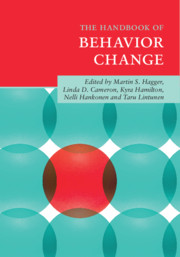Book contents
- The Handbook of Behavior Change
- The Handbook of Behavior Change
- Copyright page
- Dedication
- Contents
- Figures
- Tables
- Sidebars
- Contributors
- 1 Changing Behavior: A Theory- and Evidence-Based Approach
- Part I Theory and Behavior Change
- Part II Methods and Processes of Behavior Change: Intervention Development, Application, and Translation
- Part III Behavior Change Interventions: Practical Guides to Behavior Change
- 31 Attitudes and Persuasive Communication Interventions
- 32 Self-Efficacy Interventions
- 33 Imagery, Visualization, and Mental Simulation Interventions
- 34 Affect-Based Interventions
- 35 Autonomy-Supportive Interventions
- 36 Incentive-Based Interventions
- 37 Monitoring Interventions
- 38 Goal Setting Interventions
- 39 Planning and Implementation Intention Interventions
- 40 Self-Control Interventions
- 41 Habit Interventions
- 42 Economic and Behavioral Economic Approaches to Behavior Change
- 43 Dyadic Behavior Change Interventions
- 44 Social Identity Interventions
- 45 Motivational Interviewing Interventions
- 46 The Science of Behavior Change: The Road Ahead
- Index
- References
45 - Motivational Interviewing Interventions
from Part III - Behavior Change Interventions: Practical Guides to Behavior Change
Published online by Cambridge University Press: 04 July 2020
- The Handbook of Behavior Change
- The Handbook of Behavior Change
- Copyright page
- Dedication
- Contents
- Figures
- Tables
- Sidebars
- Contributors
- 1 Changing Behavior: A Theory- and Evidence-Based Approach
- Part I Theory and Behavior Change
- Part II Methods and Processes of Behavior Change: Intervention Development, Application, and Translation
- Part III Behavior Change Interventions: Practical Guides to Behavior Change
- 31 Attitudes and Persuasive Communication Interventions
- 32 Self-Efficacy Interventions
- 33 Imagery, Visualization, and Mental Simulation Interventions
- 34 Affect-Based Interventions
- 35 Autonomy-Supportive Interventions
- 36 Incentive-Based Interventions
- 37 Monitoring Interventions
- 38 Goal Setting Interventions
- 39 Planning and Implementation Intention Interventions
- 40 Self-Control Interventions
- 41 Habit Interventions
- 42 Economic and Behavioral Economic Approaches to Behavior Change
- 43 Dyadic Behavior Change Interventions
- 44 Social Identity Interventions
- 45 Motivational Interviewing Interventions
- 46 The Science of Behavior Change: The Road Ahead
- Index
- References
Summary
Motivational interviewing (MI) is a method of eliciting individuals’ inner motivation to change their behavior. MI is typically delivered within health care settings as well as in occupational and educational settings and in multiple populations. MI builds on practice skills that are relational and technical, aiming to evoke and reinforce client utterances in the direction of behavior change, termed change talk, and to reduce client utterances in the direction of maintaining current behaviors, termed sustain talk. Meta-analyses show that MI training leads to increased practice of relational and technical skills, and practice of relational and technical skills are related to change talk. Technical skills increase the proportion of change talk in relation to sustain talk. Sustain talk has a negative effect on behavioral outcomes, but change talk has a positive effect on behavioral outcomes. Meta-analyses also show positive effects of MI over six months in reducing or eliminating binge drinking, alcohol consumption, problematic substance use, and smoking, and increasing physical activity in chronic illness patients. Studies have shown positive effects of MI on behavior change in a range of behaviors and populations. A step-by-step guide to MI outlines typical intervention content, target populations and behaviors, practitioner training and skills required, and evaluation of fidelity and effectiveness.
Keywords
- Type
- Chapter
- Information
- The Handbook of Behavior Change , pp. 661 - 676Publisher: Cambridge University PressPrint publication year: 2020



